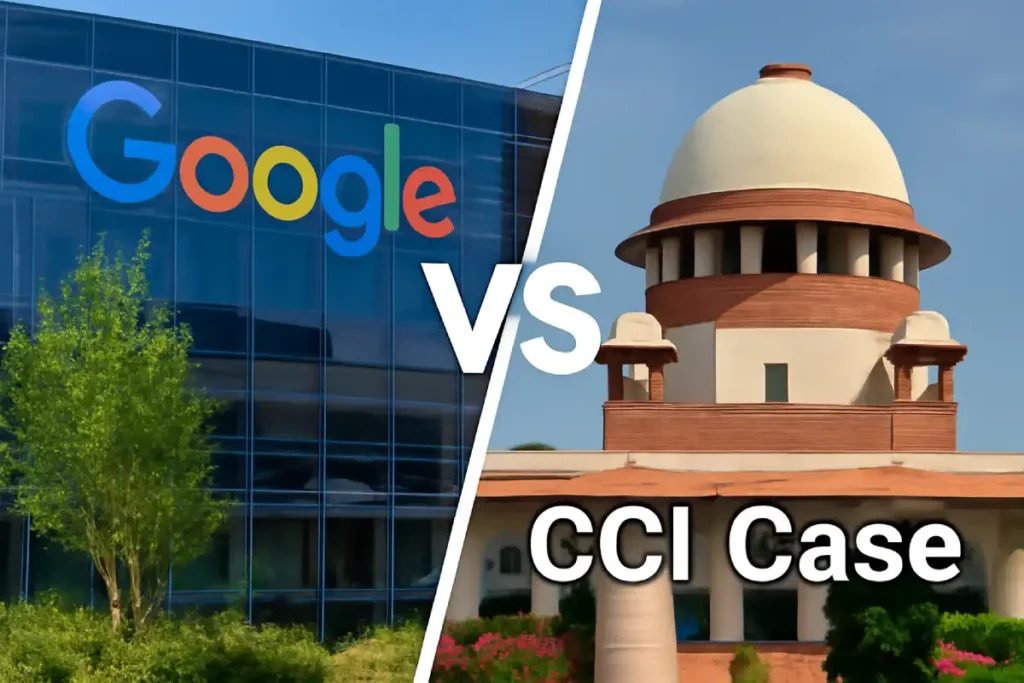The ongoing Google vs CCI Case has become one of the most significant antitrust battles in India’s digital market. Further, the Supreme Court’s final verdict could redefine how Android functions in the country, directly impacting consumers, app developers, startups, and smartphone manufacturers. Since Android powers more than 95% of India’s smartphones, this case is not just about one company—it is about the future of India’s digital ecosystem.
Google vs CCI Case: Latest Developments

The Supreme Court recently admitted Alphabet Inc.’s appeal against the NCLAT judgment that partly upheld the Competition Commission of India’s (CCI) findings of Google abusing its dominance in the Android ecosystem.
Alongside, the Court also admitted petitions from the CCI itself and the Alliance Digital India Foundation (ADIF), a group of Indian startups fighting against Big Tech’s dominance.
This marks a turning point for India’s digital market, as the ruling could set global precedents for how tech giants operate in emerging economies.
CCI’s Case Against Google
The Competition Commission of India began investigating Google in 2020 after several complaints from app developers and industry groups. In addition, they alleged that Google was using its market dominance to stifle fair competition.
By 2022, the CCI concluded that Google had engaged in anti-competitive practices, including:
- Mandatory Google Play Billing System (GPBS): Developers were forced to use GPBS, paying commissions of 15–30%, instead of integrating independent billing systems.
- Preferential Treatment to YouTube: YouTube was exempted from billing requirements, giving it a huge cost advantage.
- Bundling of Google Apps: Smartphone makers had to pre-install Google apps (Search, Chrome, YouTube, etc.) to access the Play Store, and limiting consumer choice. Further, it also discourages rival services.
The CCI fined Google ₹936.44 crore and directed several corrective measures.
Google’s Defence Against CCI’s Findings
Google strongly rejected the CCI’s conclusions, arguing that its policies ensured user safety, security, and convenience.
- It highlighted that Android is open-source and free for manufacturers.
- OEMs could license Android without pre-installing Google’s apps, though they would lose access to the Play Store.
- The Google Play Billing System (GPBS), it claimed, protected users against fraud as well as provided developers with global reach.
- It also argued that its commission fees were in line with industry standards.
Moreover, Google pointed to the success of Indian apps like PhonePe, Paytm, and Hotstar as proof of a competitive ecosystem.
NCLAT’s Partial Ruling
In March 2025, the NCLAT partly upheld the CCI’s 2022 order.
- It was agreed that Google’s mandatory billing policy and app bundling were anti-competitive.
- However, it reduced the penalty from ₹936.44 crore to ₹216.69 crore, calling the original fine excessive.
- Some remedies were struck down for being overbroad.
- In May 2025, the NCLAT reinstated key directions, including greater billing transparency and prohibiting Google from misusing developer data.
This partial outcome left Google, the CCI, and Indian startups dissatisfied, bringing the matter to the Supreme Court.
High Stakes in the Android Antitrust Battle
The Google vs CCI case will reshape India’s digital future. Its impact will be felt across consumers, startups, OEMs, and global regulatory policies.
What is the impact on Consumers ?
- More app choice and cheaper payment options if developers can bypass GPBS.
- Enhanced privacy and fairness if Google is restricted from misusing billing data.
- However, less control could risk Android fragmentation and inconsistent experiences.
What is the impact on Smartphone Makers?
- OEMs may get flexibility to pre-install rival apps without losing Play Store access.
- This could empower smaller Indian brands.
Impact on Startups and Developers
- A level playing field with more payment gateways and less bias in app promotion.
- ADIF believes this will strengthen India’s startup ecosystem.
What is the Impact on Google?
- A ruling against Google in India could inspire global regulatory action, forcing structural changes in Android’s business model.
What is Supreme Court’s Role in India’s Digital Market?
The Supreme Court’s decision will determine whether Google’s practices qualify as abuse of dominance under Indian competition law.
It will also set the tone for:
- How India regulates its digital economy.
- The balance between innovation, competition, and consumer rights.
- India’s role as a global leader in digital market regulation.
Conclusion
The Google vs CCI Case is more than a legal battle; it is a landmark moment in India’s digital journey. The Supreme Court’s verdict will influence how millions of Indians use apps, make payments, and experience the internet. A ruling in favor of the CCI could promote transparency, competition, and fairness, giving startups and consumers more choices. On the other hand, a decision favoring Google would maintain the current Android ecosystem but may limit opportunities for smaller players. Either way, this case will define India’s role in shaping global digital market regulations and set the standard for how Big Tech operates in the country.
Google vs CCI FAQs
A: The CCI started its probe in 2020 after complaints from app developers and industry bodies regarding anti-competitive practices in the Android ecosystem.
A: Mandatory Google Play Billing, bundling of apps, and preferential treatment to YouTube were flagged as anti-competitive actions.
A: Google argued its policies ensured user safety, fraud prevention, and developer benefits while pointing out that Android is open-source.
A: NCLAT partly upheld CCI’s findings, reduced the penalty, but reinstated key directives on billing transparency and data use.
A: The verdict will shape the balance of power in India’s digital market, impacting consumers, startups, and the global Android ecosystem.
CITATIONS
- What the Google Play Store antitrust case means for India’s digital ecosystem
- CCI Approves Google’s Settlement Proposal in Android TV Case











